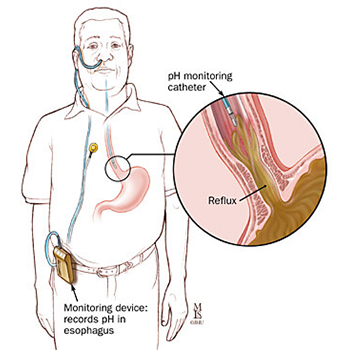24-hour pH Study with and without impedence
Are you experiencing persistent heartburn, chest pain, or difficulty swallowing? These could be signs of acid reflux disease (GERD). If you’re seeking a definitive diagnosis in Aurangabad, Dr. Ashish R. Gandhi, a board-certified gastroenterologist, offers a comprehensive 24-Hour pH Study. This advanced test precisely measures the acidity levels in your esophagus over a full day, helping Dr. Gandhi pinpoint the root cause of your discomfort and recommend the most effective treatment plan.
24-Hour pH Study: Examining Acid Reflux in the Esophagus
At Gandhi Hospital in Aurangabad, Dr. Ashish Gandhi, our gastroenterologist, may recommend a 24-hour pH study to investigate acid reflux in your esophagus. This painless test is a valuable tool for diagnosing Gastroesophageal Reflux Disease (GERD) and determining if acid reflux is the culprit behind your symptoms.
Understanding the 24-Hour pH Study
The procedure involves inserting a thin, flexible catheter with a tiny sensor at the tip through your nose and gently guiding it down into your esophagus. This sensor meticulously measures the acidity (pH level) in your esophagus throughout the day. You’ll be connected to a small data recorder worn on your waist or shoulder strap that diligently tracks these pH readings.
Preparing for the Test at Gandhi Hospital
- Fasting: You’ll likely be instructed to avoid food and drink for a few hours before the test to ensure accurate results.
- Medication Adjustments: Dr. Gandhi may advise you to temporarily stop taking certain medications, such as antacids, before the test. He will provide specific instructions based on your current medications.
- Maintaining Routine: It’s important to continue your regular activities as much as possible during the test. This helps Dr. Gandhi obtain a more accurate picture of your typical reflux patterns.
During the Procedure
- Dr. Gandhi or his team may apply a numbing gel to your nostrils for comfort during catheter insertion.
- Throughout the day, you’ll be asked to sip fluids periodically. This helps the catheter stay in place and allows for better measurement of reflux episodes.
- The data recorder will automatically and continuously record the pH levels in your esophagus.
After the Test
- After 24 hours, the catheter will be gently removed.
- You may experience some mild discomfort or a sore throat, which usually resolves quickly.
24-Hour pH Impedance Monitoring: An Alternative Approach
A variation of the standard 24-hour pH study, called pH impedance monitoring, can also be used in some cases. This technique is particularly helpful for individuals who cannot stop taking antacid medications as prescribed by Dr. Gandhi. In addition to measuring acidity, impedance monitoring has the ability to detect non-acidic reflux events involving fluids or gas.

